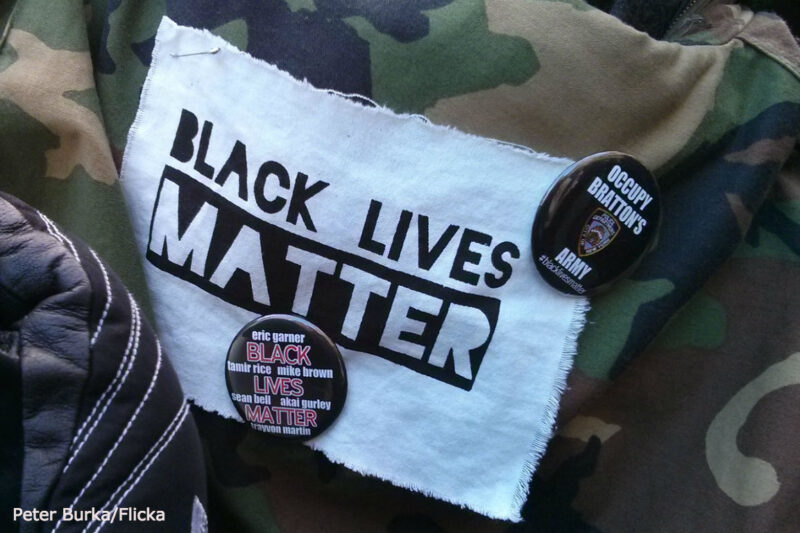
This piece originally appeared at the ACLU of Ohio.
Attorney Andrea Burton didn’t walk into a local Youngstown courtroom with a large banner or poster — she simply had a small metal button with the words “Black Lives Matter” on her lapel. That was enough for Judge Robert Milich to sentence her to five days in the Mahoning County Jail because she refused to remove the pin. While judges may have a great deal of discretion about what happens in their courtroom, this raises some significant questions and continues to highlight the need for a sustained movement for Black lives.
Ms. Burton wore the button in the courtroom when representing her client two days earlier on July 20, without any incident. After that hearing, news reports indicate that the local prosecutor approached the judge and complained about the button. At the next hearing on Friday, July 22, Judge Milich requested Ms. Burton remove the pin. She refused to do so.
Black Lives and Political Symbols
Judge Milich says he ordered Ms. Burton to remove the pin because it is “political speech” akin to wearing a button supporting someone for elected office. He said that as an officer of the court, Ms. Burton needs to remain neutral and not appear to be biased in any way. He also said, “There’s a difference between a flag, a pin from your church or the Eagles and having a pin that’s on a political issue.”
This illustrates a deep disconnect with the message of Black Lives Matter. It is not a political slogan nor is it an endorsement of particular candidates for elected office. It is a statement that Black Lives Matter in our daily lives, and a recognition that Black people are systemically and historically denied the rights and privileges that every American should be entitled to.
While Judge Milich may draw a distinction between a Black Lives Matter pin and an American flag or church pin, many people within the Black community would disagree. An American flag may be one person’s symbol of freedom and liberty, and Black Lives Matter may be a symbol of the same concepts for someone else.
Making Black Lives Matter in Court
It is especially critical that the message of Black Lives Matter be heard in our courtrooms. With the practically routine acquittal of countless police officers for violence against people of color and racial disparities in nearly every aspect of the justice system — including who gets bail, who is convicted of drug offenses, and who gets access to drug treatment — Black lives need to matter more in our justice system right now.
An American flag may be one person’s symbol of freedom and liberty, and Black Lives Matter may be a symbol of the same concepts for someone else.
The button itself did not distract from the court proceedings until the prosecutor complained about its presence. It raises the question that if Ms. Burton were wearing a Fraternal Order of Police button supporting her local police union or a Fraternal Order of the Eagles pin, would the prosecutor have spoken out and would Judge Milich have had the same reaction?
Finally, the sentence itself seems excessive in this instance. Here in northeast Ohio, we have had police officers who killed a 12-year-old boy playing with a toy gun in Cleveland and served no time in prison or jail. And now we have one attorney who dared to wear a Black Lives Matter pin who will spend five days locked up. If that isn’t a stark visual as to the problems with our justice system and valuing Black lives and Black existence, I don’t know what is.



